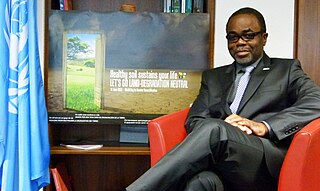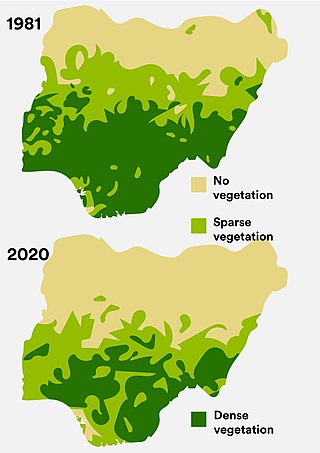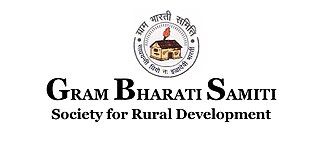
Desertification is a type of land degradation in drylands in which biological productivity is lost due to natural processes or induced by human activities whereby fertile areas become arid. It is the spread of arid areas caused by a variety of factors, such as climate change and overexploitation of soil as a result of human activity.
The United Nations Convention to Combat Desertification in Those Countries Experiencing Serious Drought and/or Desertification, Particularly in Africa (UNCCD) is a Convention to combat desertification and mitigate the effects of drought through national action programs that incorporate long-term strategies supported by international cooperation and partnership arrangements.
Rio Convention relates to the following three conventions, which were agreed at the Earth Summit held in Rio de Janeiro in June 1992.

The Global Environment Facility (GEF) is a multilateral environmental fund that provides grants and blended finance for projects related to biodiversity, climate change, international waters, land degradation, persistent organic pollutants (POPs), mercury, sustainable forest management, food security, and sustainable cities in developing countries. It is the largest source of multilateral funding for biodiversity globally, and distributes more than $1 billion a year on average to address inter-related environmental challenges.

Wangarĩ Muta Maathai was a Kenyan social, environmental and a political activist and the first African woman to win the Nobel Peace Prize. As a beneficiary of the Kennedy Airlift, she studied in the United States, earning a Bachelor's Degree from Mount St. Scholastica and a Master's Degree from the University of Pittsburgh. She went on to become the first woman in East and Central Africa to become a Doctor of Philosophy, receiving her PhD from the University of Nairobi in Kenya.

The Great Green Wall or Great Green Wall of the Sahara and the Sahel is a project led by the African Union, initially conceived as a way to combat desertification in the Sahel region and hold back expansion of the Sahara, by planting a wall of trees stretching across the entire Sahel. The modern green wall has since evolved into a program promoting water harvesting techniques, greenery protection and improving indigenous land use techniques, aimed at creating a mosaic of green and productive landscapes across North Africa.

Luc-Marie Constant Gnacadja or simply Luc Gnacadja is a Beninese politician and architect. He was Executive Secretary of the United Nations Convention to Combat Desertification from 2007 to 2013.

Logging, agriculture, and the collection of wood for fuel are cited as leading causes of forest clearing in the West African country of Nigeria. Nigerians use firewood for cooking.

Gram Bharati Samiti (GBS) or Society for Rural Development is an Indian non-governmental organisation working in the Jaipur district of Rajasthan with the aim of "establishing a society based on humanitarian, democratic values and ecologically balanced habitat".

The Biodiversity Indicators Partnership (BIP) brings together a host of international organizations working on indicator development, to provide the best available information on biodiversity trends to the global community. The Partnership was initially established to help monitor progress towards the Convention on Biological Diversity (CBD) 2010 Biodiversity target. However, since its establishment in 2006 the BIP has developed a strong identity not only within the CBD but with other Multilateral Environmental Agreements (MEAs), national and regional governments and other sectors. As a result, the Partnership will continue through international collaboration and cooperation to provide biodiversity indicator information and trends into the future.

Environment of Côte d'Ivoire

The World Day to Combat Desertification and Drought is a United Nations observance celebrated each year on 17 June. Its purpose is to raise awareness of the presence of desertification and drought, highlighting methods of preventing desertification and recovering from drought. Each year's global celebration has a unique, novel emphasis that had not been developed previously.

The Turkish Foundation for Combating Soil Erosion, better known in abbreviated form as TEMA, is a non-governmental organization (NGO) for reforestation and the protection of natural habitats in Turkey.
Drylands are defined by a scarcity of water. Drylands are zones where precipitation is balanced by evaporation from surfaces and by transpiration by plants (evapotranspiration). The United Nations Environment Program defines drylands as tropical and temperate areas with an aridity index of less than 0.65. One can classify drylands into four sub-types:

The Economics of Land Degradation (ELD) Initiative is a global initiative which aims to increase awareness of the benefits of sustainable land management and economic consequences of land degradation.
Professor Reuben James Olembo (1937–2005) was a prominent Kenyan academic, scientist and environmentalist. He was a deputy executive director of the United Nations Environment Programme (UNEP), which he played a pivotal role in helping found, and United Nations Assistant Secretary General from 1994 to 1998. He became the Acting Secretary General of the Convention on International Trade in Endangered Species of Wild Fauna and Flora (CITES), after his retirement from UNEP.
Caroline King-Okumu is an international development opportunities manager for the UK Centre for Ecology and Hydrology. She was formerly a senior researcher for the International Institute for Environment and Development (IIED). Her major areas of research are dryland ecosystems, economic and environmental assessment, and climate change. She is considered an international expert on land and water management, particularly drylands agriculture. King-Okumu is based in Kenya but is involved in research and projects throughout the world.

Sustainable Development Goal 15 is about "Life on land". One of the 17 Sustainable Development Goals established by the United Nations in 2015, the official wording is: "Protect, restore and promote sustainable use of terrestrial ecosystems, sustainably manage forests, combat desertification, and halt and reverse land degradation and halt biodiversity loss". The Goal has 12 targets to be achieved by 2030. Progress towards targets will be measured by 14 indicators.

Kehkashan BasuMSM is a Canadian environmental and human rights activist from the United Arab Emirates. Basu also advocates for peace, children’s rights, education for sustainable development, nuclear disarmament, gender equality and climate justice. She is the Founder-President of Green Hope Foundation, the youngest Councillor of World Future Council, the youngest Trustee of the Parliament of the World's Religions, a KidsRights Youngsters member, and winner of the International Children's Peace Prize 2016.
Shyam Sunder Jyani is an Indian environmentalist and academic, best known for afforestation efforts in the Indian state of Rajasthan. He is presently an associate professor of sociology at Dungar College, Bikaner.














